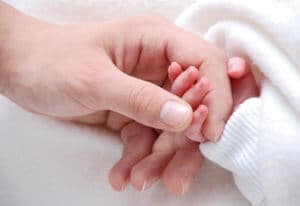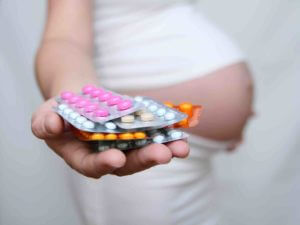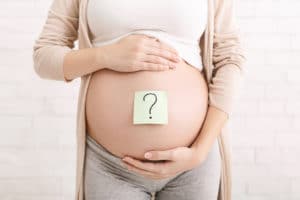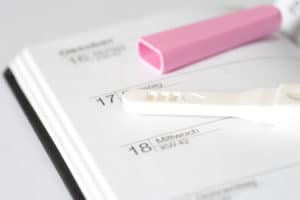Sometimes it happens unexpectedly, sometimes there is desire and planning behind it: pregnant at 50. The average age of a first-time mother is 31. Pregnancy at 50 is rarely the case, but it does happen.
Most of the time, it is women who have a late desire to have a child or who, from the onset of menopause, believe that they are no longer capable of fertilization and therefore do not use contraception.
Therefore, you should find out what differences there are to pregnancy symptoms and what special risks there are when you become pregnant at 50.
Table of contents
Pregnant At 50 Or Menopause?
To better understand your body, why you can get pregnant at 50 despite menopause, a little journey into the female anatomy:
At an age around 50, menopause begins for most women – in some cases much earlier. The first noticeable start, however, is the so-called menopause.
Here, the monthly menstrual period comes irregularly. This is due to the release of hormones. The “female” estrogen in particular decreases, then fluctuates again, rises again until it finally reaches such a low level that menstruation stops altogether.
Although menopause is also called menopause, from a medical point of view it really only begins when you have had no more periods for a period of twelve months (24 months under the age of 50). As soon as a menstrual period occurs during this time, the 12-month period begins again.
Many women believe that they can no longer get pregnant during menopause – according to the motto: no period, no ovulation, no fertilization – consequently, pregnancy around 50 is not possible.
This is wrong. You cannot predict how your hormone secretion will be today, tomorrow, next month or in two hours. So it is possible that one or more eggs will form unnoticed and be ready for fertilization.
If your pregnancy hormones are now rising, nothing stands in the way of implantation in the uterus and you are pregnant at 50 plus/minus, despite menopause.
Pregnancy Or Menopause Symptoms
The risk of miscarriage or premature birth is relatively high when you become pregnant at 40 or 50. This is often because classic pregnancy symptoms are confused with menopause symptoms.
The fact is that in both cases your hormones are “going crazy” and you may actually experience similar symptoms. If it remains undetected for you that you became pregnant at the age of 50, the risk of developmental disorders of the embryo is higher than in younger women.
From the age of 35, the aging process begins. From then on, the gynecologist speaks of a high-risk pregnancy. As soon as the first symptoms of menopause have appeared, at the latest from the age of 50, we speak of a high-risk pregnancy.
Normal body processes slow down increasingly. Due to a mostly deteriorated blood flow, the absorption of important nutrients usually works reduced. This means:
If you are unknowingly pregnant at 50 plus/minus, you may not be able to provide the embryo with optimal care, so that maldevelopments occur and the body terminates the pregnancy because the viability is not given.
Therefore, it is important that you do not confuse the symptoms of menopause with those of pregnancy. However, if you become pregnant at 50, you need to take a closer look and “listen inside” to be able to distinguish the pregnancy symptoms from the men’s menopause symptoms.
Typical Menopause Symptoms In Women
The following is a list of typical menopause symptoms, which can also often occur during pregnancy, but can sometimes be distinguished from each other by details:
- Nausea: menopausal: possible at any time.
- Headache.
- Tight breasts.
- Absence of the period.
- Bleeding: Menopause: normal – Pregnancy: often associated with a pulling in the lower abdomen (ligaments stretch and cause light bleeding in many cases, can also be implantation bleeding.
- Abdominal pain: menopause: mostly mid and upper abdomen – pregnancy: more of a pulling and pinching in the lower area.
- Fatigue.
- Vaginal discharge: Menopause: little – Pregnancy: increased.
- Dizziness.
- Mood swings: Menopause: usually easily irritable – Pregnancy: usually very emotional and tearful.
- Increase in abdominal girth: menopause: soft due to fat deposits – Pregnancy: feels like it is getting harder.
Pregnancy Test At 50 Or Older
If you experience menopausal symptoms that could indicate pregnancy because you have had unprotected sex, you should quickly take a pregnancy test and/or see your gynecologist for clarification.
If you are pregnant at 50 plus/minus, it is important that you find out about your pregnancy as early as possible so that you can act accordingly and have a positive effect on the healthy development of the embryo and on your health.
For you and your body, a pregnancy now means a much higher load, as it is, for example, the case with a 24 year old woman.
Pregnant At 50 – Increased Risk
Being pregnant at 50 and bringing a healthy child into the world is not a medical miracle today, but there is still an increased risk of miscarriage and premature birth, disabilities, developmental disorders, and diseases of the child. Late pregnancy also poses a risk to the mother, especially if she is one of the first-time mothers.
Pregnant From 40: A Genetic Defect Possible?
Statistically, the risk of miscarriage and genetic defect of the unborn baby increases sharply if you become pregnant between 40 and 50 years and the first symptoms of menopause are not far away or are already present.
Among the most common genetic defect is the Trisomy 21 which is called Down syndrome. Normally, chromosome 21 occurs only twice. In late-term mothers, i.e. pregnant at 50 plus/minus, there is a risk that it occurs three times and is thus responsible for physical as well as cognitive impairments of the child.
If you are pregnant and 50 years old or older, the genetic defect risk is highest. This is due to the fact that the so-called adhesive protein cohesin in your eggs no longer fully stabilizes the chromosomes because the binding strength decreases strongly at that age.
As a result, the chromosomes can fall apart and there is an irregular distribution of the genetic material. A special blood test from the ninth week of pregnancy provides information as to whether a genetic defect is present.
The result of a first trimester screening, which you can have done if you have become pregnant at 50, is somewhat more uncertain.
Pregnant After 40 – Increasing Risk Of Miscarriage
If the body transports/distributes fewer vitamins and nutrients with increasing age, but the need increases due to pregnancy, deficiencies can lead to miscarriage.
For example, vitamin B12, magnesium and zinc are essential for healthy and trouble-free development of the unborn child. If ideal nutrition and deficiency symptoms are not prevented, especially in the 1st trimester, developmental disorders are not uncommon.
In this case, nature takes over the decision, based on the chance of survival, whether the body will continue the pregnancy or abort it (miscarriage). The same applies if there is a genetic defect, which occurs more often in women when they become pregnant between 40 and 50 or even older.
If you are pregnant at 50, there is a further risk due to the slow cell formation as well as the “shaky” and/or reduced hormone production. For implantation to be successful, the body must form a firm endometrium that provides enough support for the embryo.
If you are already showing symptoms of menopause and your hormones are on a “merry-go-round”, hormone and cell production is often insufficient or too slow to allow optimal implantation.
As a result, your uterus cannot hold the embryo and an abortion occurs. Taking progesterone can help. You should discuss this with your gynecologist.
Fibromatosis: Menopausal Symptoms With Consequences For Birth
In addition, symptoms of fibromatosis may occur during your menopause. These are benign growths that often form during menopause. If they are located in the uterus, a natural birth can become dangerous and impossible.
Some typical fibromatosis symptoms may indicate menopause, such as a feeling of pressure. The following abnormalities and symptoms can distinguish menopause from it:
- Feeling of lumps.
- Painful irritation of the area.
Menopausal Symptoms In Women Or Pregnancy Complication?
Numerous studies have shown that pregnant women over 40 suffer significantly more often from a so-called placenta praevia. In this case, the placenta lies much lower than in the normal case in younger pregnant women.
This can lead to vaginal bleeding during pregnancy, which is sometimes dismissed as menopausal symptoms. A low-lying placenta is a serious problem because, depending on its location and condition, a natural delivery can lead to a life-threatening situation for both mother and baby if it blocks the baby’s passage.
A planned cesarean section is therefore usually required and often occurs when women become pregnant at 50.
Other Possible Risks That Are Not Symptoms Of Menopause Are
- High blood pressure.
- Extensive water retention (edema).
- Preeclampsia (blood pressure disorder during pregnancy).
- Deterioration of liver enzymes.
- Gestational diabetes.
- Second key point.
Intensive Pregnancy Control During Menopause And Symptom Formation
If menopause and symptoms are bothering the woman and in addition pregnant with 50 plus/minus, the worry about the unborn baby is an additional physical as well as mental burden.
In order to be able to react in an emergency and, if necessary, to adjust to an undesirable situation or, ideally, to rejoice in the healthy development of the unborn child, intensive medical support is advisable.
If you are pregnant at 50 and have a high-risk pregnancy, you are automatically entitled to additional ultrasound examinations at four-week intervals.
Further diagnostic measures are performed as required. Women who are pregnant and have reached or exceeded the age of 50 will also have the cost of, for example, a blood test to determine whether there is a genetic defect in the embryo/fetus covered.
Second-trimester screening is also among the examinations so that organ development can be checked. Especially if menopause brings symptoms and additionally stresses you after getting pregnant, intensive medical care is advisable so that possible consequences and pregnancy complications can be contained.
Enjoying Pregnancy Despite Menopausal Symptoms
No expectant mother wants to look back on her pregnancy with horror. Therefore, it is important that you influence your pregnancy time in the best possible way so that you can enjoy it despite menopausal symptoms and remember it fondly.
Take it down a notch and ask your gynecologist to prescribe you something against the symptoms of menopause, if they limit you a lot. Eat a healthy diet rich in vitamins.
Allow yourself breaks in which you can recharge your batteries. But above all, don’t be annoyed by negative comments because you got yourself pregnant at 50 plus/minus, because once you have your child in your arms, this happiness and the little miracle is worth more than anything else in the world.
Sources
https://www.netdoktor.at/gesundheit/frauen/wechseljahre-5316
https://flexikon.doccheck.com/de/Fibromatose
https://www.leading-medicine-guide.de/Knochen-Gelenke-Wirbelsaeule/Fibromatose












